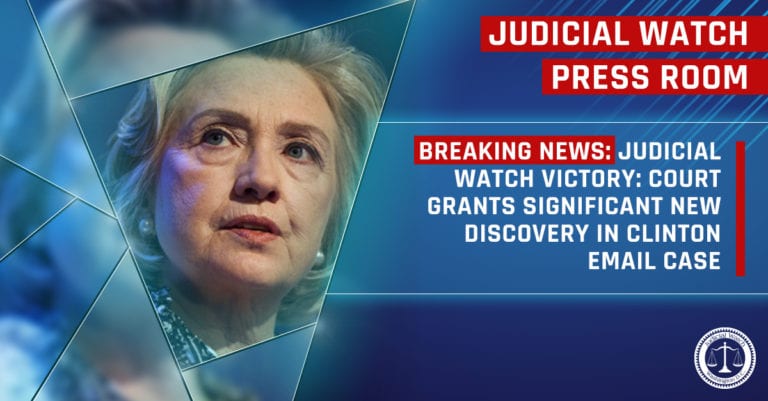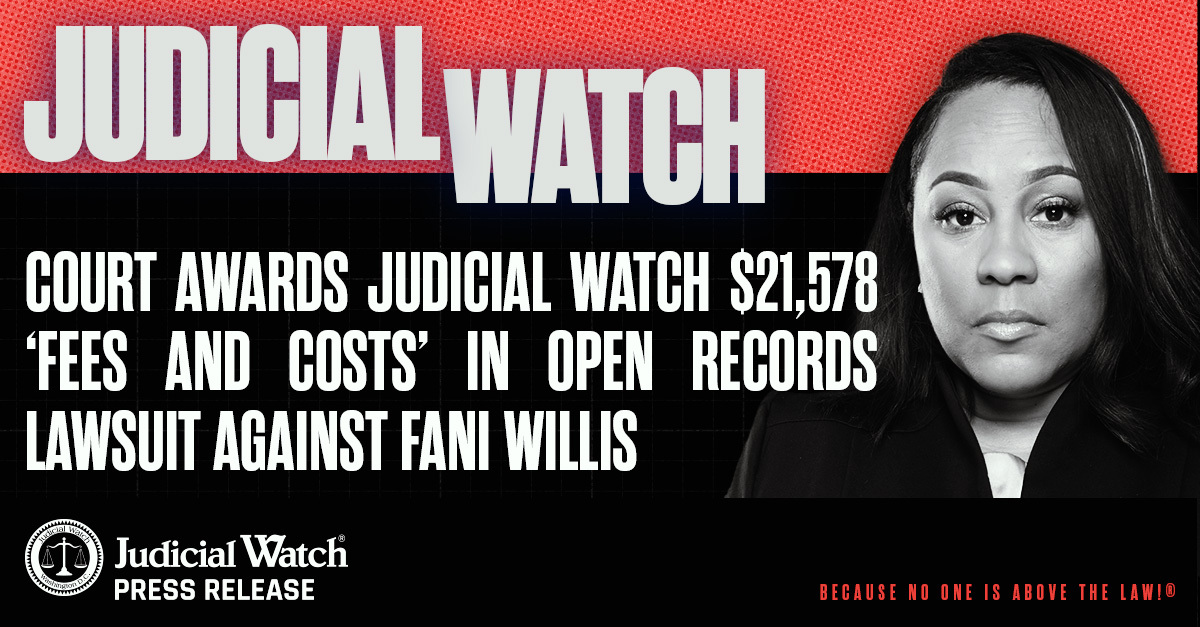

Judicial Watch Victory: Court Grants Significant New Discovery in Clinton Email Case


Hillary Clinton Has 30 Days to Oppose Judicial Watch Request to Question Her Under Oath
(Washington, DC) – Judicial Watch announced today that a federal judge granted seven additional depositions, three interrogatories and four document requests related to former Secretary of State Hillary Clinton’s use of a private, unauthorized email server. Hillary Clinton and her former top aide and current lawyer Cheryl Mills were given 30 days to oppose being deposed by Judicial Watch (Judicial Watch v. U.S. Department of State (No. 1:14-cv-01242)).
The court rejected Justice and State Department arguments to protect Clinton and the agencies from additional discovery and ordered agency lawyers to respond to Judicial Watch’s questions about their knowledge of the Clinton email issue. The court granted all of Judicial Watch’s requested discovery but gave Clinton and Mills 30 days to file any opposition to the requests to question them in person under oath.
The new court-ordered discovery allows Judicial Watch to take testimony and gather evidence of Clinton’s handling of emails, specifically in an “after action memo” drafted by Heather Samuelson, Clinton’s senior advisor at State and White House liaison. The memo was created in December 2014 to memorialize the Clinton team’s processing of the Clinton emails. The discovery also asks for when Justice and State Department attorneys learned about Clinton’s private email use; and what senior records-keeping officials at the State Department knew about Clinton’s emails and when they knew it.
This past Friday, Judicial Watch submitted the document request to Clinton’s attorneys for the “after action memo” that Samuelson created.
The court specifically raised concerns about a Clinton email cache recently discussed in a letter to Senator Charles Grassley (R-IA) and wants Judicial Watch to “shake the tree” on this issue.
“Judicial Watch uncovered the Clinton email scandal and we just found more evidence that raises further questions about the cover-up – which is why the court allowed us to pursue more leads and potentially question Mrs. Clinton under oath,” said Judicial Watch President Tom Fitton. “As ordered by the court, Judicial Watch will continue to ‘shake the tree’ on the Clinton email issue. It is shameful that the Justice and State Departments oppose our efforts and are still trying to provide cover for Hillary Clinton.”
Additionally on Friday, August 23, Judicial Watch submitted interrogatories to Department of Justice attorney Robert Prince to find out when he learned about the State Department requesting and receiving emails and federal records from Clinton and to the State Department to identify officials and documents that have been uncovered, but not identified. Judicial Watch also submitted a document request to the State Department for records reviewed in response to Gawker’s 2013 FOIA request for communications from Hillary Clinton’s email accounts sent to Sidney Blumenthal.
On December 6, 2018, U.S. District Court Judge Lamberth ordered Obama administration senior State Department officials, lawyers and Clinton aides to be deposed or answer written questions under oath. The court ruled that the Clinton email system was “one of the gravest modern offenses to government transparency.”
The court ordered discovery into three specific areas: whether Secretary Clinton’s use of a private email server was intended to stymie FOIA; whether the State Department’s intent to settle this case in late 2014 and early 2015 amounted to bad faith; and whether the State Department has adequately searched for records responsive to Judicial Watch’s request.
Judicial Watch’s discovery over the last several months found many more details about the scope of the Clinton email scandal and cover-up:
- John Hackett, former Director of Information Programs and Services (IPS) testified under oath that he had raised concerns that former Secretary of State Hillary Clinton’s staff may have “culled out 30,000” of the secretary’s “personal” emails without following strict National Archives standards. He also revealed that he believed there was interference with the formal FOIA review process related to the classification of Clinton’s Benghazi-related emails.
- Heather Samuelson, Clinton’s White House liaison at the State Department, and later Clinton’s personal lawyer, admitted under oath that she was granted immunity by the Department of Justice in June 2016.
- Justin Cooper, former aide to President Bill Clinton and Clinton Foundation employee who registered the domain name of the unsecure clintonemail.com server that Clinton used while serving as Secretary of State, testified he worked with Huma Abedin, Clinton’s deputy chief of staff, to create the non-government email system.
- In the interrogatory responses of E.W. (Bill) Priestap, assistant director of the FBI Counterintelligence Division, he stated that the agency found Clinton email records in the Obama White House, specifically, the Executive Office of the President.
- Jacob “Jake” Sullivan, Clinton’s senior advisor and deputy chief of staff when she was secretary of state, testified that both he and Clinton used her unsecure non-government email system to conduct official State Department business.
- Eric Boswell, former assistant secretary of state for diplomatic security during Clinton’s tenure as secretary of state, testified that Clinton was warned twice against using unsecure BlackBerrys and personal emails to transmit classified material.
###















